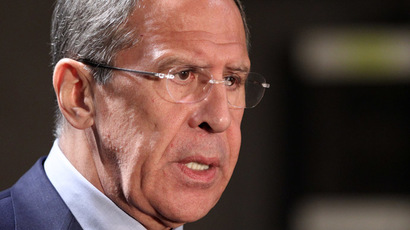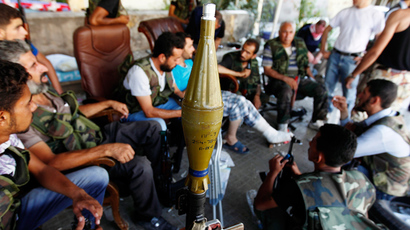Inquiry on Aleppo chemical attack met int'l standards, unlike West’s - Lavrov
Russia’s inquiry into the use of chemical weapons on Syrian territory was carried out in full accordance with international standards, unlike a similar evaluation by Western countries, says Russian Foreign Minister Sergey Lavrov.
On Tuesday, Russia submitted to the UN its analysis of the samples taken at the Syrian town where chemical weapons were used. Evidence studied by Russian scientists indicates that a projectile carrying the deadly nerve agent sarin was most likely fired at Khan al-Assal, west of Aleppo, by rebels, rather than government forces.
Russia “guarantees” the quality of the analysis, which fully
complies with the requirements set by the Organization for the
Prohibition of Chemical Weapons (OPCW), Sergey Lavrov told a
media conference on Wednesday, following talks with his
Belarusian counterpart.
In response to US doubts regarding the results of the analysis,
Lavrov underlined that the samples of the chemical weapons had
been taken at the very place where they were used and were
delivered by Russian experts rather than passed through
third-party hands.
“We submitted a full set of documents [to the UN]. That’s over
80 pages, including photographs and precise geographic
coordinates [of places where samples were taken], procedures and
results,” Lavrov pointed out. “We also guarantee that the samples
were taken by experts who did not let go of them till they were
delivered to the laboratory,” Lavrov said.
The evidence of the alleged use of chemical weapons by the Syrian regime – which was provided by the US, Britain and France – does not provide information on where and when the samples they used for analysis were taken, Lavrov noted.
Besides that, their samples passed through many hands and some of
them, as those Western partners said, were received from
journalists, he observed.

“All that totally contradicts the standards existing in the
OPCW,” Lavrov stated.
Evidence studied by Russian experts indicates that on March 19
the rebels fired an unguided missile Bashair-3 at the northern
Syrian town of Khan al-Assal, outside Aleppo, which has been
under government control. According to the findings, the
shell used in Khan al-Assal was not factory-made and contained
sarin – a highly toxic nerve agent.
Russia believes that the manufacture of the ‘Bashair-3’ warheads
started in February, and is the work of Bashair al-Nasr, a
brigade with close ties to the Free Syrian Army.
Moscow has no objection to making the results of its probe
public, Lavrov pointed out.
“[The conclusions of the inquiry] are quite convincing and I
think that this should answer many questions,” he said.
Meanwhile, the opposition Syrian National Coalition denied
Russian allegations that rebel forces used chemical weapon at the
suburb of Aleppo. They insist that UN inspectors should be
allowed to investigate the attack.
British Labour MP Jeremy Corbyn told RT that “it’s got to be a
good thing that Russia is going to put its evidence in front of
the UN.”
Responding to comments from the US, Britain, and France that they
have unconfirmed reports that the Syrian regime used chemical
weapons, Corbyn said “the reports are either confirmed and the
evidence is there, or it’s not, and anyone who has any evidence
should hand it straight over to the UN.”
“The usage of chemical weapons is inconsistent with the
guiding principles and goals of the Syrian revolution,”
Khalid Saleh, a spokesman for the coalition said on Wednesday, as
cited by Reuters. “Targeting civilians indiscriminately to
achieve political gains is a common characteristic of the Assad
regime,” he added.
The Syrian government and rebels have blamed each other for the
March incident outside Aleppo that killed 26 people as well as
for other alleged chemical attacks in the conflict-torn
country.
On Monday, the Syrian government invited two senior UN officials to Damascus to discuss allegations of the use of chemical weapons, adding that they discovered a rebels-linked storage site which contained piles of dangerous chemicals.
The UN Secretary General’s spokesperson described the offer as “a move in the right direction,” but did not say whether the organization would accept it. Martin Nesirky said the Syrian government needed to grant the UN team broad access across the country “without further delay and without conditions.”














